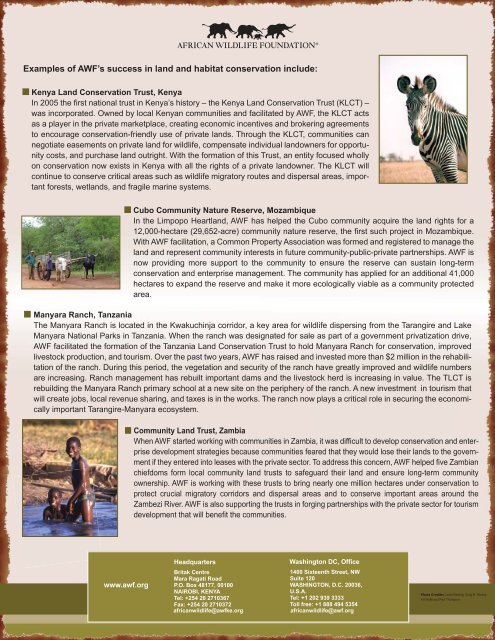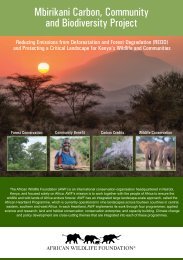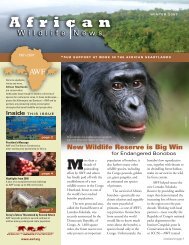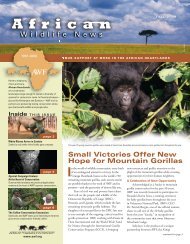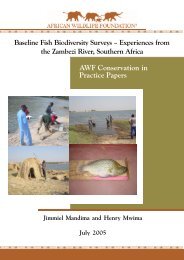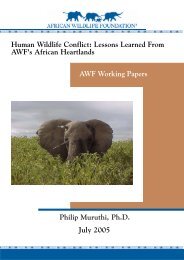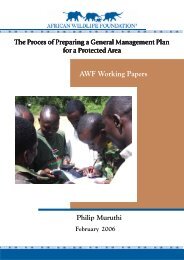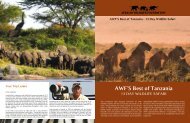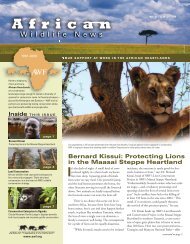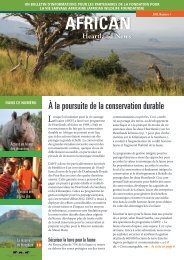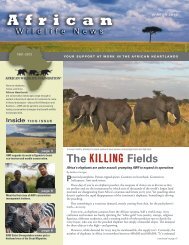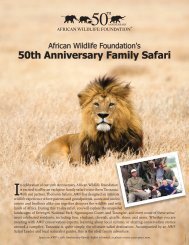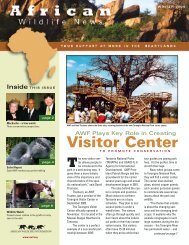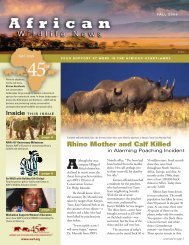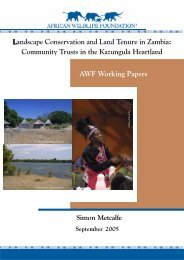Land and Habitat Conservation - African Wildlife Foundation
Land and Habitat Conservation - African Wildlife Foundation
Land and Habitat Conservation - African Wildlife Foundation
You also want an ePaper? Increase the reach of your titles
YUMPU automatically turns print PDFs into web optimized ePapers that Google loves.
Examples of AWF’s success in l<strong>and</strong> <strong>and</strong> habitat conservation include:<br />
Kenya <strong>L<strong>and</strong></strong> <strong>Conservation</strong> Trust, Kenya<br />
In 2005 the first national trust in Kenya’s history – the Kenya <strong>L<strong>and</strong></strong> <strong>Conservation</strong> Trust (KLCT) –<br />
was incorporated. Owned by local Kenyan communities <strong>and</strong> facilitated by AWF, the KLCT acts<br />
as a player in the private marketplace, creating economic incentives <strong>and</strong> brokering agreements<br />
to encourage conservation-friendly use of private l<strong>and</strong>s. Through the KLCT, communities can<br />
negotiate easements on private l<strong>and</strong> for wildlife, compensate individual l<strong>and</strong>owners for opportunity<br />
costs, <strong>and</strong> purchase l<strong>and</strong> outright. With the formation of this Trust, an entity focused wholly<br />
on conservation now exists in Kenya with all the rights of a private l<strong>and</strong>owner. The KLCT will<br />
continue to conserve critical areas such as wildlife migratory routes <strong>and</strong> dispersal areas, important<br />
forests, wetl<strong>and</strong>s, <strong>and</strong> fragile marine systems.<br />
Cubo Community Nature Reserve, Mozambique<br />
In the Limpopo Heartl<strong>and</strong>, AWF has helped the Cubo community acquire the l<strong>and</strong> rights for a<br />
12,000-hectare (29,652-acre) community nature reserve, the first such project in Mozambique.<br />
With AWF facilitation, a Common Property Association was formed <strong>and</strong> registered to manage the<br />
l<strong>and</strong> <strong>and</strong> represent community interests in future community-public-private partnerships. AWF is<br />
now providing more support to the community to ensure the reserve can sustain long-term<br />
conservation <strong>and</strong> enterprise management. The community has applied for an additional 41,000<br />
hectares to exp<strong>and</strong> the reserve <strong>and</strong> make it more ecologically viable as a community protected<br />
area.<br />
Manyara Ranch, Tanzania<br />
The Manyara Ranch is located in the Kwakuchinja corridor, a key area for wildlife dispersing from the Tarangire <strong>and</strong> Lake<br />
Manyara National Parks in Tanzania. When the ranch was designated for sale as part of a government privatization drive,<br />
AWF facilitated the formation of the Tanzania <strong>L<strong>and</strong></strong> <strong>Conservation</strong> Trust to hold Manyara Ranch for conservation, improved<br />
livestock production, <strong>and</strong> tourism. Over the past two years, AWF has raised <strong>and</strong> invested more than $2 million in the rehabilitation<br />
of the ranch. During this period, the vegetation <strong>and</strong> security of the ranch have greatly improved <strong>and</strong> wildlife numbers<br />
are increasing. Ranch management has rebuilt important dams <strong>and</strong> the livestock herd is increasing in value. The TLCT is<br />
rebuilding the Manyara Ranch primary school at a new site on the periphery of the ranch. A new investment in tourism that<br />
will create jobs, local revenue sharing, <strong>and</strong> taxes is in the works. The ranch now plays a critical role in securing the economically<br />
important Tarangire-Manyara ecosystem.<br />
Community <strong>L<strong>and</strong></strong> Trust, Zambia<br />
When AWF started working with communities in Zambia, it was difficult to develop conservation <strong>and</strong> enterprise<br />
development strategies because communities feared that they would lose their l<strong>and</strong>s to the government<br />
if they entered into leases with the private sector. To address this concern, AWF helped five Zambian<br />
chiefdoms form local community l<strong>and</strong> trusts to safeguard their l<strong>and</strong> <strong>and</strong> ensure long-term community<br />
ownership. AWF is working with these trusts to bring nearly one million hectares under conservation to<br />
protect crucial migratory corridors <strong>and</strong> dispersal areas <strong>and</strong> to conserve important areas around the<br />
Zambezi River. AWF is also supporting the trusts in forging partnerships with the private sector for tourism<br />
development that will benefit the communities.<br />
www.awf.org<br />
Headquarters<br />
Britak Centre<br />
Mara Ragati Road<br />
P.O. Box 48177, 00100<br />
NAIROBI, KENYA<br />
Tel: +254 20 2710367<br />
Fax: +254 20 2710372<br />
africanwildlife@awfke.org<br />
Washington DC, Office<br />
1400 Sixteenth Street, NW<br />
Suite 120<br />
WASHINGTON, D.C. 20036,<br />
U.S.A.<br />
Tel: +1 202 939 3333<br />
Toll free: +1 888 494 5354<br />
africanwildlife@awf.org<br />
Photo Credits: Cardo Kleberg, Craig R. Sholley,<br />
Art Wolfe <strong>and</strong> Paul Thompson


